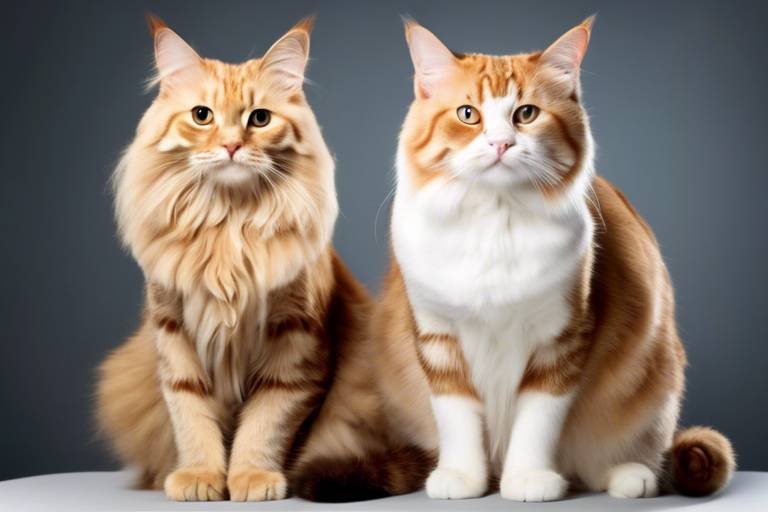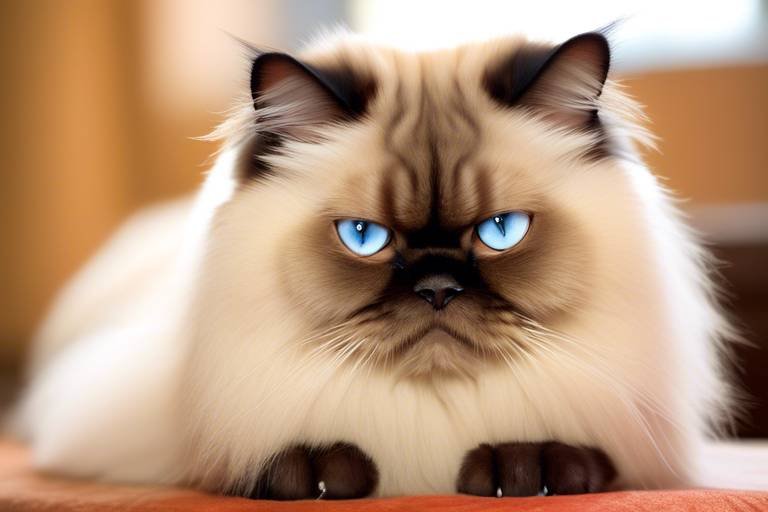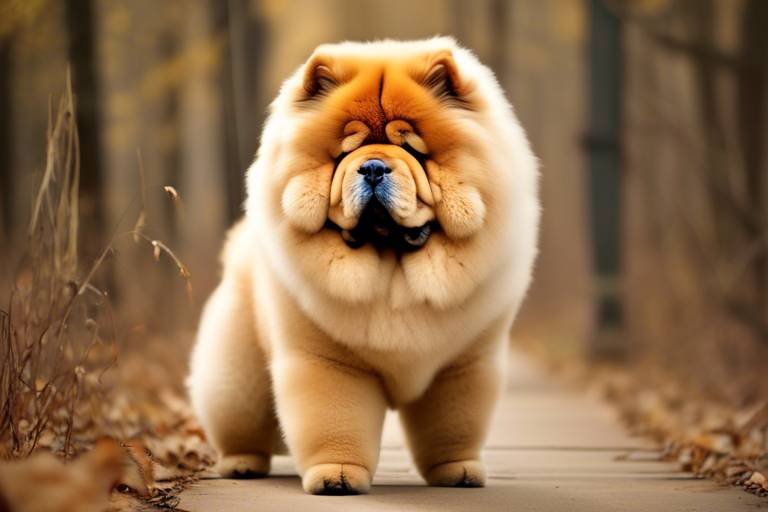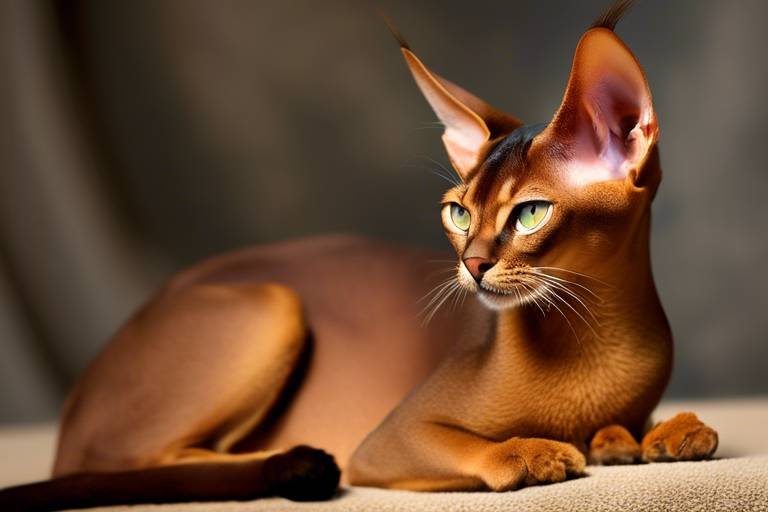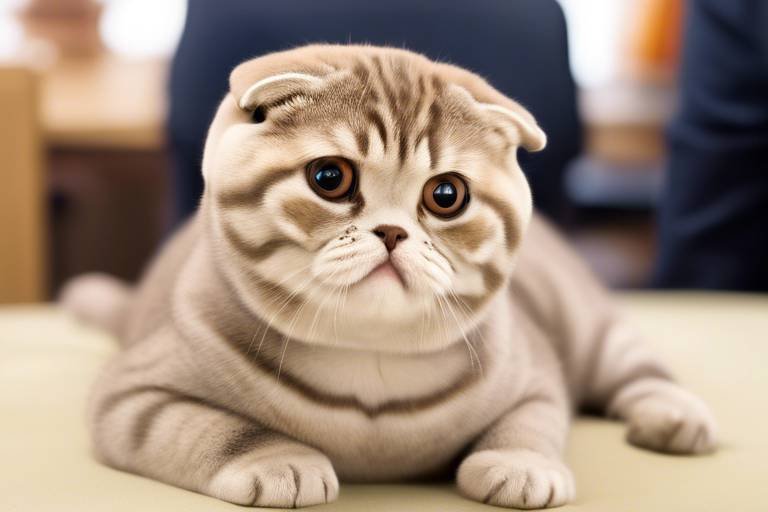Understanding the Differences in Cat Breeds
Choosing a cat can be as thrilling as unwrapping a surprise gift. With so many breeds available, each with its own unique characteristics, it’s essential to understand these differences to make an informed decision. Every cat breed boasts its own personality, quirks, and care requirements, making the journey of cat ownership both exciting and challenging. From the chatty Siamese to the gentle Maine Coon, each breed offers something special that can resonate with different lifestyles and preferences.
Understanding the significance of various cat breeds enhances our appreciation for these furry companions. Just like people, cats have their own personalities and traits that can influence how they interact with us and our families. For example, while some cats are laid-back and enjoy lounging around, others are energetic and love to play. This diversity in behavior is largely influenced by genetics, which is why knowing the breed can help in selecting a cat that fits seamlessly into your life.
Moreover, recognizing the differences among cat breeds can help potential owners prepare for their new feline friends. Each breed may have distinct grooming needs, dietary requirements, and health considerations. For instance, long-haired breeds like the Persian require regular grooming to prevent matting, while short-haired breeds like the British Shorthair are generally easier to maintain. This understanding can save you time, effort, and potential heartache down the line.
In the following sections, we will delve deeper into popular cat breeds, exploring their origins, physical traits, and personalities. We’ll also discuss how to choose the right breed for your lifestyle, considering factors like energy levels and allergies. Whether you’re a first-time cat owner or looking to add another furry friend to your family, understanding the differences in cat breeds will empower you to make the best choice for both you and your future feline companion.
Understanding the significance of different cat breeds can enhance our appreciation for these animals, influencing our choices in companionship, care, and training based on their distinct traits and temperaments.
This section delves into some of the most popular cat breeds, discussing their origins, physical characteristics, and specific personality traits that make them beloved pets in households worldwide.
Siamese cats are known for their striking appearance and vocal nature. This section covers their history, distinctive features, and the unique personalities that set them apart from other breeds.
Siamese cats have a unique appearance characterized by their short coat, striking blue almond-shaped eyes, and color points. This section discusses these physical traits in detail.
Siamese cats are known for their social and vocal personalities. This section explores their affectionate nature and how they interact with humans and other pets.
Maine Coons are one of the largest domesticated cat breeds, admired for their friendly demeanor and tufted ears. This section highlights their characteristics, grooming needs, and suitability as family pets.
Selecting the appropriate cat breed involves considering your lifestyle, living situation, and personal preferences. This section provides guidance on matching breeds to various lifestyles and care requirements.
Different cat breeds exhibit varying energy levels. This section categorizes breeds into active and low-energy types, helping owners choose a cat that fits their activity level and home environment.
For allergy sufferers, selecting a hypoallergenic breed can be crucial. This section discusses hypoallergenic cat breeds and their unique characteristics that may reduce allergic reactions in sensitive individuals.
Q: What is the best cat breed for families with children?
A: Breeds like the Maine Coon and Ragdoll are often recommended for families due to their gentle and sociable nature.
Q: Are there truly hypoallergenic cat breeds?
A: Yes, breeds such as the Siberian and Balinese are known to produce fewer allergens, making them suitable for allergy sufferers.
Q: How do I choose the right breed for my lifestyle?
A: Consider your activity level, living space, and any allergies. Research breeds that match your lifestyle to ensure a good fit.
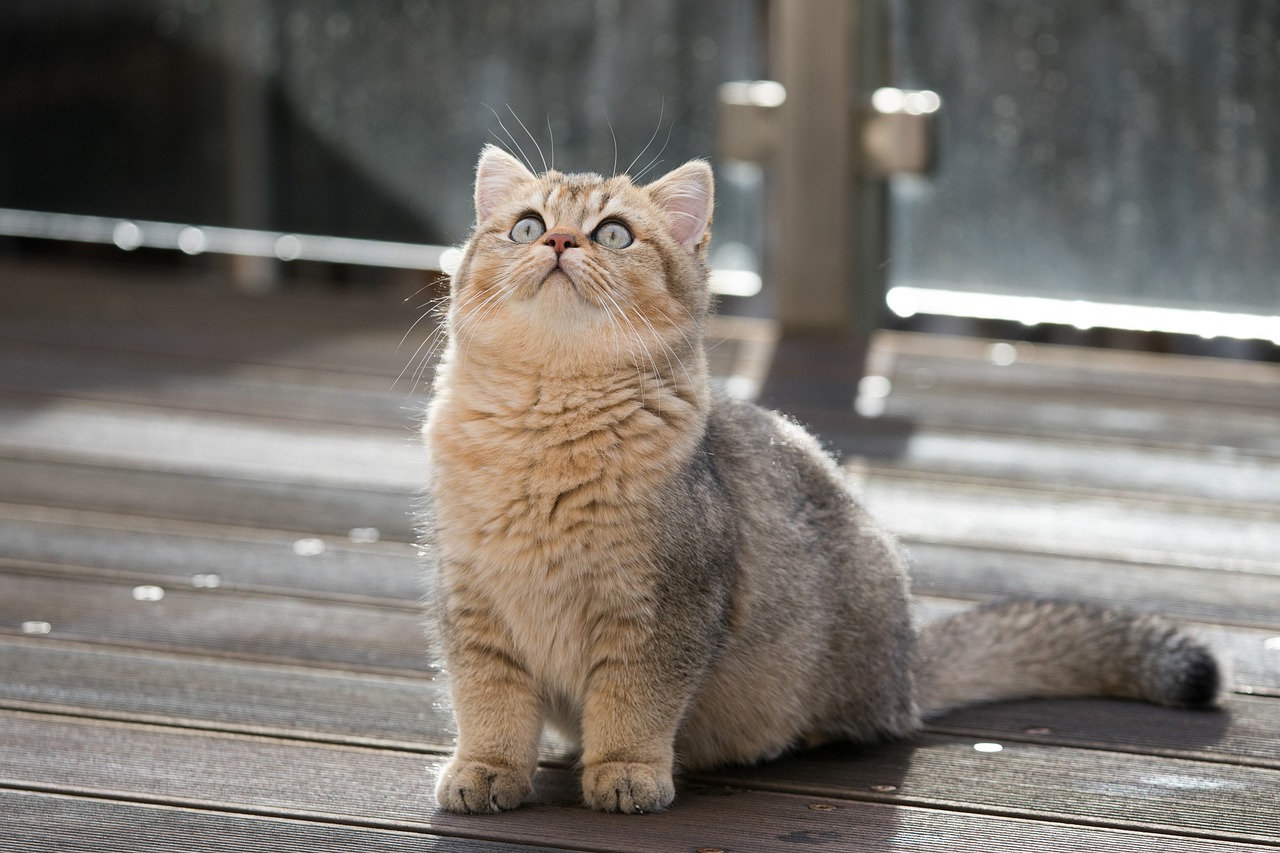
The Importance of Cat Breeds
Understanding the significance of different cat breeds can greatly enhance our appreciation for these fascinating animals. Just like people, cats come in a variety of personalities, temperaments, and quirks that can influence our choices in companionship, care, and training. Imagine walking into a room filled with cats, each one with its own unique charm and character; it’s like a mini universe of furry friends, each contributing to the tapestry of our lives in their own special way.
When considering a cat, it's essential to recognize that not all breeds are created equal. Each breed has its own set of traits that can affect everything from how much exercise they require to how they interact with their human companions. For instance, some breeds are naturally more affectionate, while others may be more independent. This diversity is crucial for potential cat owners to understand, as it helps them select a feline friend that fits their lifestyle. A busy professional might prefer a low-energy breed that enjoys lounging, while a family with kids might lean towards a more playful and energetic cat.
Additionally, different breeds have varying grooming needs, health issues, and life spans. For example, Persian cats require regular grooming to maintain their luxurious coats, while Siamese cats are generally low-maintenance in this regard. Understanding these differences allows owners to prepare adequately for the responsibilities of cat ownership. It's not just about finding a cute face; it’s about ensuring that both the cat and the owner are a good match.
Moreover, the breed can also influence behavior. Some cats are known for being vocal and social, while others may be more reserved and quiet. This can significantly affect how they adapt to household dynamics. For example, a Siamese cat, known for its chatty nature, might thrive in a home where it receives plenty of attention and interaction, while a Maine Coon, with its friendly demeanor, may be the perfect companion for children or families.
In essence, the importance of understanding cat breeds extends beyond mere aesthetics; it is about fostering a harmonious living environment where both the cat and the owner can thrive. It’s about making informed decisions that lead to lasting relationships filled with love, joy, and mutual respect. So, as you embark on your journey to find the perfect feline companion, take a moment to appreciate the rich tapestry of cat breeds available. Each one has a story to tell and a unique personality waiting to be discovered.

Popular Cat Breeds
When it comes to choosing a feline friend, understanding the variety of can make all the difference. Each breed has its own unique story, personality, and set of needs. From the sleek and vocal Siamese to the gentle giant Maine Coon, these breeds have captured the hearts of cat lovers around the world. But what makes each of them so special? Let’s dive into the fascinating world of cat breeds and discover what sets them apart.
The Siamese cat, with its striking appearance and chatty demeanor, is one of the most recognizable breeds. Known for their blue almond-shaped eyes and color points, Siamese cats have a rich history that dates back to ancient Thailand. Their social nature makes them excellent companions, often forming strong bonds with their human families. However, their vocal tendencies can sometimes be a surprise for first-time owners. If you’re looking for a cat that will engage you in conversation, a Siamese might just be the perfect fit!
On the other hand, the Maine Coon is a breed that boasts both size and charm. These cats are among the largest domesticated breeds and are known for their tufted ears and bushy tails. Maine Coons are often described as gentle giants due to their friendly and affectionate nature. They tend to get along well with children and other pets, making them a popular choice for families. Their long, thick fur requires regular grooming, but many owners find the effort worthwhile for such a loving companion.
| Breed | Origin | Physical Traits | Personality Traits |
|---|---|---|---|
| Siamese | Thailand | Short coat, blue almond-shaped eyes, color points | Vocal, social, affectionate |
| Maine Coon | United States | Large size, tufted ears, bushy tail | Friendly, gentle, good with families |
Beyond Siamese and Maine Coons, there are many other breeds worth mentioning. The Persian cat, with its long, luxurious coat and sweet demeanor, is a favorite among those who appreciate a more laid-back companion. Then there’s the Bengal, known for its stunning spotted coat and energetic personality, perfect for active households. Each breed brings its own flair to the table, making the decision of which cat to adopt an exciting yet challenging one.
When considering a cat breed, it’s essential to think about not just the looks but also the temperament and care needs. Some breeds require more grooming than others, while certain personalities may not mesh well with your lifestyle. By understanding these differences, potential cat owners can make informed decisions that lead to a harmonious home.
- What is the best cat breed for families? Generally, breeds like the Maine Coon and Ragdoll are known for their friendly and tolerant nature, making them great family pets.
- Are there hypoallergenic cat breeds? Yes, breeds such as the Siberian and Balinese are often considered hypoallergenic as they produce fewer allergens.
- How do I choose the right breed for my lifestyle? Consider your activity level, living space, and any allergies. Research breeds that match your lifestyle for a better fit.
Siamese Cats
Siamese cats are truly a fascinating breed that captures the hearts of cat lovers around the world. With their striking appearance and unique vocalizations, they stand out in any room. Originating from Thailand, formerly known as Siam, these cats have a rich history that dates back centuries. Their regal demeanor and affectionate nature make them one of the most popular choices for pet owners. Have you ever met a Siamese cat? If not, you're in for a treat!
One of the most distinctive features of Siamese cats is their beautiful coat. They possess a short, fine coat that is typically cream or fawn in color, contrasted with darker "points" on their ears, face, paws, and tail. These color points can vary, showcasing a range of hues from chocolate to lilac. The striking blue almond-shaped eyes are another hallmark of the breed, giving them a mesmerizing look that many find irresistible. It's almost as if they can see right into your soul!
But it's not just their looks that make Siamese cats special; their personalities are equally captivating. Known for being social butterflies, these cats thrive on interaction and companionship. They are incredibly vocal, often expressing their feelings through a variety of sounds, from soft chirps to loud yowls. This vocal nature can sometimes surprise new owners, as Siamese cats are not shy about communicating their needs. Imagine having a chatty friend who always wants to share their thoughts—this is what living with a Siamese cat is like!
In terms of behavior, Siamese cats are highly intelligent and curious. They love to explore their surroundings and engage in interactive play. Whether it's chasing a feather toy or investigating a new box, their playful antics can bring endless entertainment to your home. It's essential to provide them with plenty of mental and physical stimulation to keep them happy and healthy. If you're considering adopting a Siamese, be prepared for a companion that will keep you on your toes!
When it comes to care, Siamese cats require regular grooming, though their short coats mean they don't mat easily. A simple weekly brushing will suffice to keep their fur in top condition. Additionally, they thrive in environments where they can bond with their human family members. Siamese cats are known to form strong attachments to their owners, often following them around the house and seeking out their company. This loyalty is one of the many reasons why they are cherished as family pets.
In conclusion, Siamese cats are more than just a pretty face; they are dynamic companions that bring joy and laughter to any household. If you're ready for a cat that is affectionate, vocal, and full of personality, a Siamese might just be the perfect fit for you!
- Are Siamese cats hypoallergenic? While no cat is completely hypoallergenic, Siamese cats are known to produce fewer allergens compared to other breeds.
- How much exercise do Siamese cats need? Siamese cats are active and playful, requiring daily playtime and mental stimulation to stay healthy.
- Do Siamese cats get along with other pets? Generally, Siamese cats are social and can get along well with other pets if introduced properly.
Physical Traits of Siamese Cats
Siamese cats are truly a visual delight, boasting a unique and striking appearance that sets them apart from other breeds. One of their most notable features is their short, fine coat, which comes in a variety of colors but is typically seen in a cream or fawn base with darker points on the ears, face, paws, and tail. These darker areas can be a rich chocolate, seal, blue, or lilac, adding to their exotic allure. The contrast between their light bodies and dark points creates a stunning visual effect that captivates cat lovers around the world.
Another defining characteristic of Siamese cats is their almond-shaped blue eyes. These mesmerizing eyes are not just beautiful; they are also a hallmark of the breed, giving them an expressive and intelligent look. Siamese cats have a sleek, muscular build, which contributes to their elegance. Their bodies are medium-sized, and they are known for their long, slender legs and long tails that often appear almost whip-like in motion. This athletic build is complemented by their distinctive triangle-shaped head, which further enhances their overall graceful appearance.
When it comes to grooming, Siamese cats are relatively low-maintenance due to their short coats. They do not require extensive brushing, but they do enjoy the occasional grooming session, which helps to strengthen the bond between the cat and its owner. Regular grooming also allows owners to check for any skin issues or parasites, ensuring that their feline friend stays healthy and happy.
In summary, the physical traits of Siamese cats not only contribute to their beauty but also reflect their unique personality. Their striking appearance, combined with their social nature, makes them a popular choice among cat enthusiasts. If you’re considering adding a Siamese to your family, be prepared to be enchanted by their looks and captivated by their charm!
- What colors do Siamese cats come in? Siamese cats typically have a cream or fawn base color with darker points in colors like chocolate, seal, blue, or lilac.
- Do Siamese cats require special grooming? No, their short coats require minimal grooming, but they enjoy occasional brushing.
- Are Siamese cats good with children? Yes, they are known for their affectionate and social nature, making them great companions for families.
- How vocal are Siamese cats? Siamese cats are very vocal and are known for their distinctive, loud meows.
Personality of Siamese Cats
Siamese cats are not just another pretty face; they come with a personality that is as striking as their appearance. Known for their social and vocal nature, these felines are like the extroverts of the cat world. If you’ve ever met a Siamese, you know they’re not shy about expressing their feelings—whether it’s a gentle purr or a loud, demanding meow. They thrive on interaction and are often described as affectionate companions who enjoy being in the thick of family activities.
One of the most fascinating aspects of Siamese cats is their strong bond with their human companions. They are not the type to sit quietly in the corner; instead, they want to be involved in everything you do. Imagine having a little shadow that follows you around the house, always eager to lend a paw—or a meow—when you need it. This breed is particularly known for their loyalty, making them feel more like a dog than a traditional cat. They often form deep attachments to their owners, and it’s not uncommon for them to greet you at the door, ready to share in your day.
But let’s not forget that their vocalizations are a big part of their charm. Siamese cats are notorious for their loud and chatty behavior. They have a unique way of communicating that can range from soft chirps to loud yowls, often conveying their needs and desires with impressive clarity. If you’re looking for a quiet cat, you might want to reconsider; these cats are like little furry talk show hosts, always ready to engage in a lively conversation.
In terms of playfulness, Siamese cats are incredibly active. They love to engage in games and are known for their intelligence. You might find them playing fetch or solving puzzles, displaying a level of curiosity that keeps their owners entertained. They require mental stimulation, so interactive toys and playtime are essential to keep them happy and healthy. In fact, many Siamese owners will tell you that their cats have a knack for learning tricks, which can be both amusing and impressive.
However, it’s important to remember that their social nature means they don’t like being left alone for long periods. If you’re gone all day, a Siamese might become lonely and even develop behavioral issues. They thrive in environments where they have company, whether it’s humans or other pets. For those considering adopting a Siamese, think about your lifestyle—are you home often enough to give them the attention they crave?
In summary, if you’re looking for a cat that is affectionate, vocal, and playful, a Siamese might just be the perfect addition to your family. They bring a unique blend of charm and personality that can enrich your life and keep you entertained. Just be prepared for a cat that wants to be part of everything you do, because a Siamese will certainly make their presence known!
- Are Siamese cats good with children?
Siamese cats are generally good with children due to their playful and social nature. They enjoy interaction and can be quite tolerant of kids, making them a great family pet. - Do Siamese cats need a lot of attention?
Yes, Siamese cats thrive on attention and companionship. They do not like being left alone for long periods, so they are best suited for families or individuals who can spend time with them. - How vocal are Siamese cats?
Siamese cats are known for being very vocal. They communicate through a range of sounds and are not afraid to express their needs and desires loudly. - What type of environment is best for a Siamese cat?
Siamese cats do well in lively environments where they can interact with their owners and other pets. They need mental stimulation and playtime to keep them happy.
Maine Coon Cats
Maine Coon cats are often described as gentle giants, and for good reason! These magnificent felines are one of the largest domesticated cat breeds, weighing anywhere from 10 to 25 pounds. Their impressive size is complemented by a friendly demeanor that makes them a beloved choice among cat enthusiasts. Originating from the rugged landscapes of Maine, these cats have adapted remarkably well to various environments, making them suitable companions for families and individuals alike.
One of the first things you'll notice about Maine Coons is their distinctive appearance. They boast a long, tufted tail that resembles a raccoon’s, which is where they get their name. Their large, tufted ears and bushy fur not only add to their charm but also help them withstand cold weather. In fact, their thick, water-repellent coat is designed to keep them warm during harsh winters, making them well-suited for outdoor adventures. If you’re considering a Maine Coon, be prepared for some grooming, as their lush fur requires regular brushing to prevent matting.
But it’s not just their looks that make Maine Coons special; their personalities are equally captivating. Known for their affectionate nature, these cats are often described as “dog-like” because of their loyalty and playful behavior. They enjoy being involved in family activities and are known to follow their owners around the house, curious about everything happening around them. Maine Coons are also quite sociable, often getting along well with children, other pets, and even strangers. This makes them ideal companions for families looking for a loving and interactive pet.
When it comes to care, Maine Coons do have some specific needs. They require a balanced diet to maintain their health and energy levels, especially given their larger size. Regular vet check-ups are essential to monitor their weight and overall well-being. Additionally, because of their playful nature, providing them with toys and interactive playtime is crucial for keeping them mentally stimulated. They thrive on companionship, so adopting a second cat or spending ample time with them can lead to a happier, healthier Maine Coon.
In summary, Maine Coon cats are not just about size; they embody a blend of beauty, personality, and adaptability that makes them stand out in the feline world. Their affectionate nature and playful spirit make them wonderful companions for anyone ready to welcome a furry friend into their home.
- Are Maine Coons good with children? Yes, Maine Coons are known for their gentle and friendly nature, making them great companions for children.
- How much grooming do Maine Coons require? Maine Coons require regular grooming due to their long fur, ideally once a week to prevent matting.
- Do Maine Coons get along with other pets? Generally, Maine Coons are very sociable and can get along well with other cats and even dogs.
- What is the average lifespan of a Maine Coon? Maine Coons typically live between 12 to 15 years, though some can live longer with proper care.

Choosing the Right Breed for Your Lifestyle
When it comes to selecting a cat breed, it's not just about picking the cutest face you see. Oh no, my friend! It’s about finding a feline companion that fits seamlessly into your lifestyle. Think of it like choosing a dance partner; you want someone who matches your rhythm, right? Whether you're a busy professional, a stay-at-home parent, or someone who enjoys a quiet life, the right cat breed can make all the difference. So, how do you go about making this important choice?
First, consider your daily routine. Are you out of the house for long hours? If so, you might want to lean towards a breed that is more independent. Breeds like the Russian Blue or the British Shorthair tend to be more self-sufficient and can handle being alone for longer periods. On the other hand, if you’re home most of the day and crave companionship, breeds like the Siamese or Ragdoll will thrive on your attention and affection.
Next, think about your living situation. Do you live in a small apartment or a spacious house? Some breeds are more adaptable to smaller spaces than others. For instance, the Scottish Fold or the American Shorthair are known for their easy-going nature and can comfortably live in smaller environments. Conversely, larger breeds like the Maine Coon or Norwegian Forest Cat require more room to roam and play. It’s essential to ensure that your living space can accommodate the breed you choose.
Another crucial aspect to consider is your activity level. Are you an active individual who enjoys playing and engaging in physical activities? If so, you might want a breed that shares that enthusiasm. Cats like the Bengal or Oriental Shorthair are known for their playful and energetic personalities, making them perfect companions for those who enjoy an active lifestyle. Alternatively, if you prefer a more laid-back existence, breeds such as the Persian or Exotic Shorthair might be more your speed, as they tend to be more relaxed and enjoy lounging around.
Of course, we can't forget about allergies. If you or someone in your household suffers from allergies, it’s wise to consider hypoallergenic breeds. While no cat is entirely hypoallergenic, some breeds like the Siberian or Balinese produce fewer allergens. This could be a game-changer for allergy sufferers, allowing them to enjoy the company of a furry friend without the sneezes.
In summary, choosing the right cat breed for your lifestyle is all about understanding your needs and preferences. It’s a bit like finding the perfect puzzle piece; when it fits just right, everything falls into place. Take your time, do your research, and consider the factors that will affect both your life and the life of your future feline friend. After all, a happy cat makes for a happy home!
- What is the best cat breed for families with children?
Breeds like the Maine Coon and Ragdoll are known for their gentle and friendly demeanor, making them great companions for kids. - Are there cat breeds that require less grooming?
Yes, breeds such as the American Shorthair and British Shorthair have short coats that require minimal grooming compared to long-haired breeds. - Can I have a cat if I live in a small apartment?
Absolutely! Many breeds, including the Scottish Fold and Russian Blue, adapt well to apartment living. - What if I have allergies?
Consider hypoallergenic breeds like the Siberian or Balinese, which may produce fewer allergens.
Active vs. Low-Energy Breeds
When it comes to choosing a cat, one of the most critical factors to consider is their energy level. Just like people, cats have unique personalities that can range from hyperactive and playful to calm and laid-back. Understanding whether you want an active or low-energy breed can significantly impact your experience as a cat owner. Active breeds, such as the Bengal or Abyssinian, are often bursting with energy and require plenty of stimulation. They love to play, climb, and engage in interactive activities. If you lead a busy lifestyle and enjoy spending time engaging with your pet, an active breed might be the perfect fit.
On the other hand, low-energy breeds, like the Persian or British Shorthair, are more relaxed and prefer lounging around the house. These cats are often content to curl up on the couch and enjoy a peaceful environment. They may still enjoy playtime, but their bursts of energy are usually shorter and less intense. This makes them ideal for individuals or families who prefer a more laid-back companion. It's important to assess your own lifestyle and energy levels when making this choice. Are you someone who enjoys long play sessions, or do you prefer a quiet evening with a cat purring in your lap?
To help you visualize the differences, here’s a quick comparison of active and low-energy breeds:
| Characteristic | Active Breeds | Low-Energy Breeds |
|---|---|---|
| Playfulness | High | Moderate |
| Exercise Needs | Daily playtime required | Minimal exercise needed |
| Social Interaction | Enjoys interaction and games | Prefers quiet companionship |
| Ideal Home | Active families, homes with space | Quiet households, seniors |
Ultimately, the choice between an active or low-energy breed comes down to your personal preferences and lifestyle. If you’re looking for a furry friend that will keep you on your toes, an active breed could be the ideal match. However, if you desire a calm and affectionate companion to share quiet moments with, a low-energy breed might be the way to go. Remember, each cat is an individual, and while breed characteristics can provide a guideline, your cat's unique personality will shine through regardless of their energy level.
- What are some examples of active cat breeds? Active breeds include the Bengal, Abyssinian, and Siamese.
- Which cat breeds are considered low-energy? Low-energy breeds include the Persian, British Shorthair, and Ragdoll.
- How can I keep an active cat entertained? Engage them with interactive toys, climbing trees, and regular playtime.
- Are low-energy cats suitable for families? Yes, they can be great companions for families seeking a calm pet.
Allergies and Hypoallergenic Breeds
For many potential cat owners, the excitement of bringing home a furry friend can quickly be dampened by the concern of allergies. Did you know that approximately 10% to 15% of the population is allergic to cats? This is primarily due to proteins found in cat saliva, skin, and urine. However, fear not! There are hypoallergenic cat breeds that can significantly reduce allergic reactions, making it possible for allergy sufferers to enjoy the companionship of a feline.
Hypoallergenic cat breeds are often misunderstood. They don’t produce no allergens; instead, they produce fewer allergens than traditional breeds. This means that if you’re allergic, opting for one of these breeds might help minimize your symptoms. Some of the most popular hypoallergenic breeds include:
- Siberian: Despite their long fur, Siberians are known to produce lower levels of the Fel d 1 protein, which is the primary allergen.
- Balinese: Often referred to as the "long-haired Siamese," Balinese cats are known for their affectionate nature and lower allergenic properties.
- Bengal: These stunning cats not only have a unique coat but also produce less Fel d 1, making them a great choice for allergy sufferers.
- Oriental Shorthair: With their sleek appearance and playful personality, Oriental Shorthairs produce fewer allergens and are a joy to have around.
While choosing a hypoallergenic breed can be a game-changer, it’s important to remember that individual reactions can vary. It is always wise to spend time with a breed before making a commitment. This way, you can gauge your allergic reactions in a controlled environment. Additionally, maintaining a clean home can help alleviate allergy symptoms. Regularly grooming your cat, vacuuming, and using air purifiers can make a significant difference.
In conclusion, if you’re an allergy sufferer dreaming of owning a cat, don’t lose hope! Researching hypoallergenic breeds and understanding their characteristics can lead you to find a perfect feline companion that fits your lifestyle. Remember, the journey to finding your furry friend should be enjoyable and fulfilling, even with allergies in the mix!
Here are some common questions regarding hypoallergenic cat breeds:
| Question | Answer |
|---|---|
| What makes a cat hypoallergenic? | Hypoallergenic cats produce lower levels of allergens, particularly the Fel d 1 protein, which is responsible for most cat allergies. |
| Can I still be allergic to a hypoallergenic cat? | Yes, while hypoallergenic cats may produce fewer allergens, individual reactions can vary, and some people may still experience allergies. |
| What is the best way to minimize allergies if I own a cat? | Regular grooming, cleaning your home frequently, and using air purifiers can help reduce allergens in your environment. |
Frequently Asked Questions
- What are the key differences between cat breeds?
Cat breeds vary significantly in terms of physical traits, personality, and care needs. For example, some breeds like the Siamese are very vocal and social, while others, such as the Maine Coon, are known for their gentle demeanor and size. Understanding these differences helps potential cat owners choose a breed that aligns with their lifestyle and preferences.
- How do I choose the right cat breed for my lifestyle?
Choosing the right cat breed involves assessing your living situation, activity level, and personal preferences. Consider whether you want a high-energy cat that loves to play or a more laid-back breed that enjoys lounging around. Also, think about your living space—some breeds require more room to roam than others.
- Are there hypoallergenic cat breeds?
Yes, there are hypoallergenic cat breeds that may be suitable for allergy sufferers. Breeds such as the Siberian and Balinese produce fewer allergens compared to other cats. However, it’s essential to spend time with a breed before committing, as individual reactions can vary.
- What are the grooming needs for different cat breeds?
Grooming needs can differ widely among cat breeds. Long-haired breeds like the Persian require regular grooming to prevent matting, while short-haired breeds like the American Shorthair may need less frequent brushing. Always consider the grooming requirements of a breed before bringing a cat home.
- How do cat personalities vary among breeds?
Cat personalities can vary significantly from one breed to another. For instance, Siamese cats are often described as affectionate and vocal, while Maine Coons are known for their friendly and easygoing nature. Understanding these personality traits can help in selecting a cat that fits well with your family and lifestyle.
- Can I have multiple cat breeds in one household?
Yes, having multiple cat breeds in one household can work well, as long as you consider their individual temperaments and social needs. Some breeds are more sociable and adaptable, while others may prefer solitude. Proper introductions and gradual acclimation are key to ensuring harmony among your feline friends.



